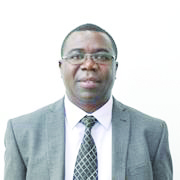CHAMBWA MOONGA,
MONICA KAYOMBO, Lusaka
ZAMBIA National Public Health Institute (ZNPHI) director-general Roma Chilengi says the New Dawn administration wants Zambia to be a model country on matters of public health on the African ontinent. Professor Chilengi, who doubles as health advisor to President Hakainde Hichilema, says the three[1]day international Conference on Public Health in Africa (CPHIA) is unique. The high-level CPHIA, the third of its kind, was opened by President Hichilema at Mulungushi International Conference Centre – Kenneth Kaunda Wing in Lusaka yesterday. In light of numerous obstacles, ranging from financing mechanisms, over-reliance on donor funds, instability and growing population, inter alia, which beset public health in Africa, policy-makers, scientists, experts and advocates have converged at this year’s CPHIA to share essons and experiences to forge a way forward on building stronger health systems on the continent. CPHIA is organised by Africa Centre for Disease Control (CDC) – the health security wing of African Union (AU). The gathering is being held under the theme: ‘Breaking barriers: Repositioning Africa in the global health architecture’. In answering the question, ‘Is Africa innovating and investing enough in public health?’ on ZNBC TV’s Sunday Interview programme, Prof Chilengi started by highlighting the mportance of the conference. “It [conference] gives us an opportunity to focus and address problems which are African-related,” he said. “The conference is important for Zambia [because] the current administration wants to position itself as a leader in many spheres, including public health. “We want to be a model country that tackles and takes leadership on public health matters, so a conference like this is a great opportunity for a country like Zambia to demonstrate leadership.” Prof Chilengi said Africa CDC saw it fit that Africa sets up a platform focused on public health on the continent. He said the first CPHIA was held virtually because it happened during the peak of COVID-19 while the second one took place in Kigali, Rwanda, last year. “So, we are fortunate to be hosting the third conference. It’s really going to be the largest so far. This is a conference that is organised by Africans completely, so it is the first of its kind in those dimensions because typically, scientific conferences have ever been arranged by colleagues and counterparts from the West, North, and Africans tend to participate in there,” Prof Chilengi said. He said between 4,000 and 5,000 delegates are participating in CPHIA. “We have a very big platform and for virtual participation, the estimates so far seem to indicate that we may get well over 15,000 people,” said Prof Chilengi. Meanwhile, USAID [United States Agency for International Development] – Zambia health office has partnered with Government, civil society and private sector to support local solutions to challenges impeding Zambia’s economic growth. And Healthcare Federation of Zambia (HFZ) chairperson Shailen Desai says the federation has signed a memorandum of understanding (MoU) with Private-Public Dialogue Forum (PPFF) to lobby for policy and regulatory changes that support ustainable and responsible growth of the private health market in Zambia. Speaking on Sunday during a cocktail in Lusaka, USAID[1]Zambia health office deputy director Monica Bautista said public-private collaboration is critical to developing and implementing local health solutions. Ms Bautista said USAID is also ready to support HFZ as a platform for public[1]private sector dialogue and coordination in the Zambian healthcare market. And Dr Desai said the MoU also aims to collaborate with other regional federations to share experiences and contribution to growth of the private health market on the continent.


